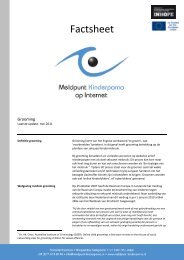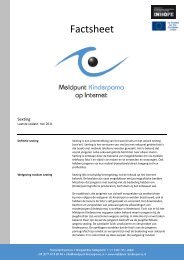sexual exploitation of children over the internet - Meldpunt ...
sexual exploitation of children over the internet - Meldpunt ...
sexual exploitation of children over the internet - Meldpunt ...
You also want an ePaper? Increase the reach of your titles
YUMPU automatically turns print PDFs into web optimized ePapers that Google loves.
• The use <strong>of</strong> anonymizers and o<strong>the</strong>r encryption methods poses a substantial threat tolaw enforcement’s ability to investigate and bring charges against individuals whocreate, trade, or o<strong>the</strong>rwise distribute images <strong>of</strong> child pornography <strong>over</strong> <strong>the</strong>Internet. Industry and law enforcement need to work toge<strong>the</strong>r to develop methodsthat will allow law enforcement agents to access data related to child <strong>sexual</strong><strong>exploitation</strong> cases while protecting customers’ needs to secure <strong>the</strong>ir private dataunrelated to those cases.• Currently, NCMEC houses a central database <strong>of</strong> known images <strong>of</strong> child <strong>sexual</strong><strong>exploitation</strong>, which includes images found through investigations conducted byU.S. law enforcement, such as <strong>the</strong> FBI, ICE, and USPIS. It is important that allU.S. law enforcement agencies at <strong>the</strong> federal and state level have access to thiscentralized database to consult when investigating crimes involving <strong>the</strong> <strong>sexual</strong><strong>exploitation</strong> <strong>of</strong> a child online.• ISPs that provide connectivity to <strong>the</strong> Internet do not retain Internet Protocol (“IP”)address data linked to a subscriber for <strong>the</strong> same amount <strong>of</strong> time. ISPs that providecontent also have a wide variety <strong>of</strong> data retention times for IP addresses andsubscriber information.• It is critically important to investigations involving <strong>the</strong> online <strong>sexual</strong> <strong>exploitation</strong><strong>of</strong> <strong>children</strong> that law enforcement agents are able to access IP address data linkedto a subscriber—particularly that information kept by ISPs that provideconnectivity to <strong>the</strong> Internet. Pursuant to 18 U.S.C. § 2703(f), once a lawenforcement agent sends a data preservation request to an ISP, <strong>the</strong> ISP must retain<strong>the</strong> data described in <strong>the</strong> request for 90 days, a period which can be extended anadditional 90 days if law enforcement requests. Once a preservation request orsubpoena has been issued, ISPs should make every effort to respond to lawenforcement as expeditiously as possible. Without this information, <strong>the</strong>investigation is likely to hit a dead end and a child in danger may not be rescued.• Child pornography investigations <strong>of</strong>ten take months to develop, during whichtime critical data, such as IP addresses linked to a subscriber’s account, may belost if <strong>the</strong> Internet Service Provider does not have an adequate retention policy.• Law enforcement agents who testified at <strong>the</strong> Subcommittee’s April 6, 2006hearing supported a data retention policy <strong>of</strong> at least one year for IP addressinformation. Due to <strong>the</strong> fact that harm may be occurring to a child in real-timeduring an investigation involving <strong>the</strong> <strong>sexual</strong> <strong>exploitation</strong> <strong>of</strong> <strong>children</strong> <strong>over</strong> <strong>the</strong>Internet, Congress should consider requiring ISPs that provide connectivity to <strong>the</strong>Internet to retain such IP address information linked to subscriber informationnecessary to allow law enforcement agents to identify <strong>the</strong> IP address being used todownload or transmit child pornography images and only for so long as necessaryto accomplish that purpose.4















